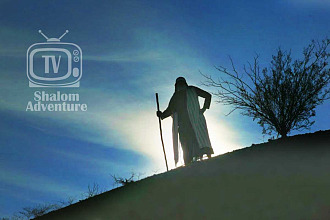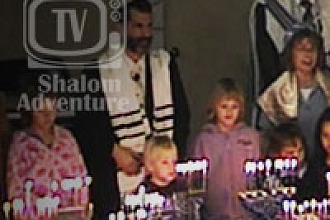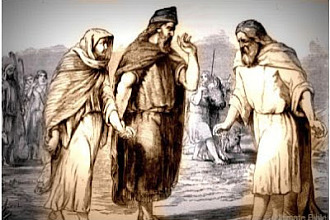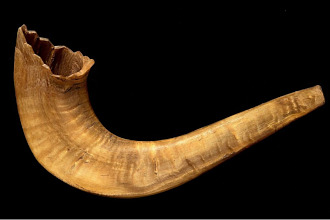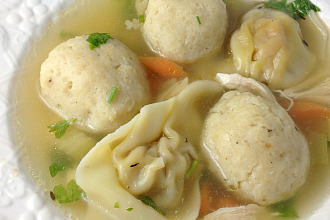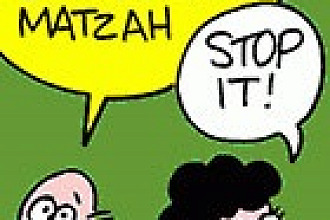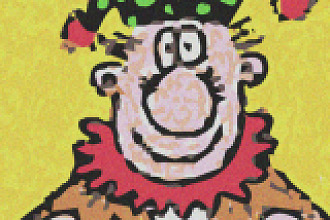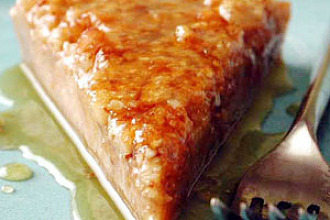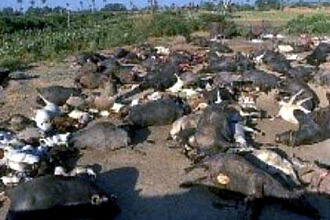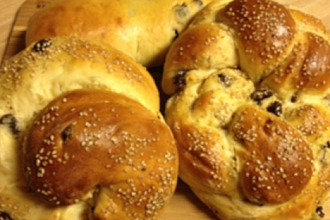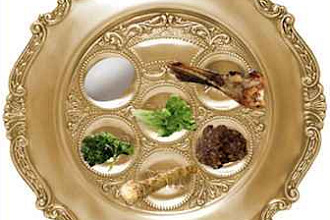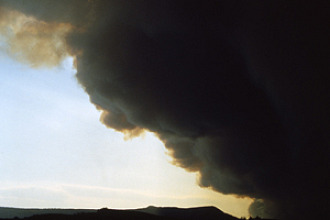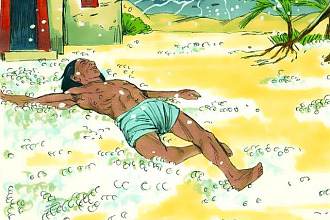(CNN) - Almost 70 years after his village in Poland was liberated by the Soviet army, Leon Gersten is meeting the man who is the Oskar Schindler of his own life: Czeslaw Polziec. Polziec is Catholic. His family secretly sheltered Gersten in rural Poland for two years during World War II.
As though such a reunion between survivor and rescuer were not emotional enough, this one is taking place Wednesday on the eve of Hanukkah, which coincides this year with Thanksgiving. Two celebrations of gratitude.
Gersten, 79, had tried to imagine how he might feel when he would finally meet his Polish friend at John F. Kennedy International Airport. He said only this: "I think it will be a physical reaction."
And it was. The two men embraced. Then, they embraced again.
"Hi, hi, hi," Polziec said, his English limited to just a few words.
But words seemed useless now anyway. For Gersten, none seemed adequate for a man who saved his life. A man who had, through his actions, given him precious assurance there was goodness left in a world that seemed purely evil.
"I am alive because of them," Gersten said of Polziec and his family. "They are heroes."
Gersten had waited for this day when he could express his gratitude in person. When he could show Polziec his children, grandchildren and great-grandchildren. They were the greatest proof of the enormity of the Polziec family's actions.
As a boy, Leon Gersten hid for two years with his mother and other family members in the attic of a barn.
With Polziec by his side, Gersten's Hanukkah promises to be special. He plans to perform an act he was never able to do when he was in hiding on Polziec's family farm, one that will celebrate the miracle of his survival.
The shared memories will take Gersten back to Frystak, Poland. To July 1942.
Gersten's mother, Frieda Tepper Gersten, worked as a peddler and traveled throughout southern Poland, ...shortly after Germany invaded Poland in September 1939. ...Gersten never saw his father or siblings again. He has no photos except one of his sister. He knows they all perished but everything else is blank. Where? When? How?
His mother knew she and her son would die, too, unless she escaped the Jewish ghetto. She disguised herself as a Catholic, a cross around her neck. With her boy, she walked into the countryside and knocked on the doors of her customers to ask for shelter for herself and her son - as well as her sister and brother-in-law and their son.
Many turned her away. It was risky to come to the aid of Jews. It could prove fatal.
But the Polziecs were different.
Maria and Stanislaw Polziec lived on a farm in nearby Zawadka with their four daughters and son, Czeslaw. They had barely the means to feed their own family, let alone buy food for five strangers.
But they took in the desperate Jews and created a living space for them in a dark attic above their barn. Czeslaw Polziec brought them food and stood guard when other people came to the farm.
Gersten remembers receiving one big loaf of bread a week. . . . And there were potatoes.
On some winter nights, the attic got cold and the Polziecs invited their Jewish guests into their home to spend the evening in warmth.
They built an earthen bunker in the barn to hide Gersten and his family for the times when Germans raided the farm. It measured 4 feet by 3 feet and was just big enough to hold five people. It resembled a grave, really. The Polziecs slid a big, wooden grain storage bin over the opening to deflect suspicion.
One night, Nazi collaborators raided the farm and heard the footsteps of Gersten's family scurrying into the bunker. They questioned Stanislaw Polziec, who blamed the noise on children in the attic. The collaborators beat Stanislaw, bloodied him without mercy. Gersten could hear the Polziec family's screams. Still, the Polziecs did not betray the Jews.
Gersten said he remains impressed the Polziecs never showed any resentment toward their Jewish guests for the enormous danger they had brought them.
Gersten remained in the Polziec's attic for two years, until the day in 1944 when Soviet soldiers liberated the area. Gersten and his mother eventually moved to America.
For many years after, Gersten had dreams of being shot by the Nazis. He liked sleeping when it rained. All those months in hiding, he'd felt secure on stormy nights, knowing the Nazis would not go out to look for Jews then...
"My mother was very religious," he said. "She had a more positive outlook about surviving, although we could never answer why God would want us to survive over others."
Gersten and his mother kept up with the Polziecs after the war. They sent a few dollars and care packages with clothes back to Poland.
Over the years, he lost contact with the Polziecs. But after his mother died, Gersten wrote to the Jewish Historical Society in Poland about what the Polziecs had done. About two years ago, he decided to submit the family's name to Yad Vashem, Israel's official memorial to victims of the Holocaust. The memorial also recognizes non-Jews who helped Jews survive. Schindler's name is in that database, as are the Polziecs'.
In America, The Jewish Foundation for the Righteous helped Gersten find Czeslaw Polziec in Poland. His parents had passed away years before.
The New York-based foundation supports non-Jews who refused to remain passive during the Holocaust. About 650 rescuers in Europe receive funding for food and essential goods like heating fuel.
The foundation is sponsoring Polziec's visit to New York, including a dinner honoring him and his family.
Gersten, meanwhile, said he remains amazed by the loyalty of the Polziecs, especially Czeslaw and his sisters, who were so young then. They went to school and church and interacted with so many people. Yet they never uttered a word.
On Wednesday night, Gersten is looking forward to lighting a Hanukkah menorah, which commemorates the rededication of the ancient temple and the miracle of one day's worth of oil lasting eight.
Gersten was never able to light a menorah when he was hiding in Polziec's home. The light would have given away the family's presence, put an end to their survival. Now with Polziec finally by his side again, Gersten's menorah will symbolize his own family's miracle.



